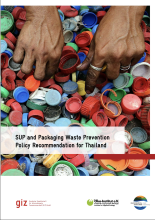SUP and Packaging Waste Prevention Policy Recommendation for Thailand
(available in Thai and English / the summary brochures also available)

In Thailand, increasing urbanization and changing lifestyles have spurred an enormous increase in the use of single-use plastics and packaging. Sound management of plastic waste is, thus, one of the major challenges faced by the country. Currently, most of the plastic waste is still either disposed of in the environment and uncontrolled dumpsites, landfilled, or incinerated. Such practices lead to wastage of primary resources and cause pollution and littering. While policies, investments and debate to improve waste management, such as better waste collection, segregation and recycling, continue to progress over the years in Thailand, tangible plans to follow the circular economy principle of Thailand’s Bio-Circular -Green Economy (BCG) Action Plan 2021-2027 that aims at reducing the overall consumption and incentivizing widespread reuse of plastics, have not been prepared yet.
The objective of this policy brief is to support the vision of the Bio-Circular-Green Economy Model (BCG Model) of Thailand. The main focus of this policy brief is on promoting the circularity of plastic materials through upstream measures, i.e., prevention, reuse, and design approaches for supporting better recycling in Thailand. Downstream measures related to waste management are only touched on briefly but would require separate research, and dedicated analysis of plastic material flow. The policy brief was prepared within the project “Collaborative Actions for Single-Use Plastic Prevention in South-East Asia (CAP SEA)”, with the support of the partner institutions in Thailand that contribute to the development and implementation of the BCG Action Plan.
Clara Löw
Saengroj Srisawaskraisorn
Orathai Pongruktham